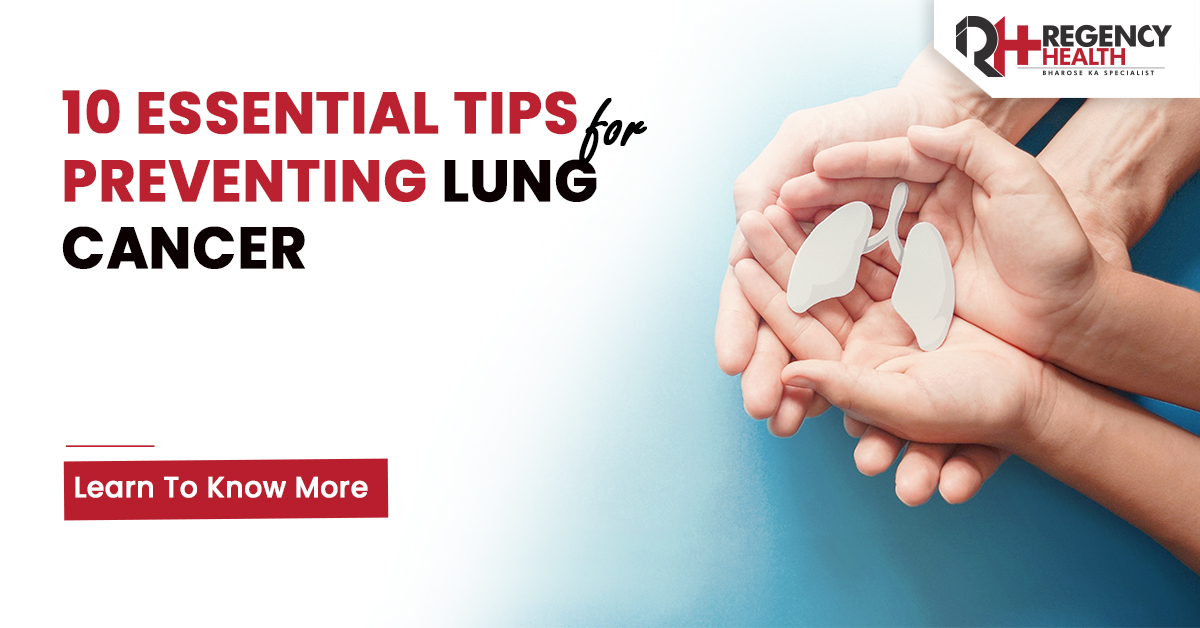
There is no foolproof technique to entirely safeguard oneself against cancer. However, there are numerous actions you may take in order to lower your risk of developing lung cancer. One of the most effective ways to lower your risk of lung cancer and enhance your general health is to stop using tobacco products or avoid starting them in the first place. Apart from the obvious adherence to tobacco, there are additional factors that might contribute to the prevention of lung cancer.
No matter your smoking history, you should take every precaution to prevent lung cancer for yourself and your family. It’s never too late to begin reducing risk factors and changing your lifestyle to help prevent this disease. Often we have people wondering about various lung cancer prevention techniques and looking out for What is the best way to prevent lung cancer?
Let’s examine 10 ways to prevent cancer that will help you in reducing the risk of this fatal disease.
- Quit Smoking
Lung cancer was a relatively uncommon condition during the beginning of the 20th century. The rise of smoking across the world during this period led to an increase in lung cancer cases. In fact, smoking and tobacco consumption are thought to be responsible for around 90% of lung cancer cases all over the world.
Smoking increases your chance of lung cancer by 25 times. The risk of experiencing cancer is further high in smoking women. But, this doesn’t mean that men are immune to this. The risk for both remains extremely high.
One of the best methods to avoid lung cancer is to stop smoking. Quitting smoking can reduce your risk of lung cancer by 30 to 50% after 10 years compared to people who continue smoking.
- Stay away from passive smoking (second-hand smoke)
Secondhand smoke refers to inhaling smoke from cigarettes or cigars consumed by smokers around you. You may be a non-smoker, but continuous exposure to second-hand smoke can significantly increase your chances of lung cancer.
Many of the toxins from cigarettes are inhaled when you breathe in secondhand smoke. This smoke contains about 70 compounds that are recognized carcinogens, and there are hundreds more that are dangerous. Exposure to secondhand smoke, even briefly, can elevate the risk of lung cancer.
Although laws have limited exposure to secondhand smoke in public places, it’s still necessary to take every precaution to keep yourself and others from breathing it in at home and at work.
- Check family history
If your immediate family member such as a parent or sibling has cancer, you may have a two to three times greater chance of developing lung cancer. Get a full body health checkup and cancer screening in particular at your nearest multi super speciality hospital. Environmental and genetic factors both play a role in heightening this risk.
Make sure to contact your doctor if any members of your immediate family—smokers or nonsmokers—develop lung cancer. They might advise certain screenings to help lower your risk.
- Get an HIV test
Lung cancer risk is increased by the human immunodeficiency virus (HIV). In fact, studies suggest that HIV may double your risk of getting lung cancer.
A higher risk of lung cancer could result from a number of factors, such as the following:
-People with HIV have greater rates of smoking.
-HIV causes bodywide inflammation
-HIV infection has immunosuppressive properties.
- Limit chest exposure to radiation
Your DNA can be harmed by high-energy radiation, including X-rays, gamma rays, and other radioactive waves, which raises your risk of developing cancer.
Your lungs may suffer from cell damage from specific medical tests that could result in cancer. These tests include:
a CT scan or a chest X-ray
a PET test
radiation treatment
These procedures carry a modest risk, and generally speaking, the advantages outweigh the disadvantages. However, if you have additional lung cancer risk factors, you might wish to discuss safer alternatives with your doctor.
- Stay physically fit
Physical activity may lower the incidence of lung cancer by up to 20% for women and up to 50% for men. Exercise reduces your risk significantly.
Although experts are unsure of the specific link between exercise and lung cancer, a few potential contributing factors include:
-improved lung capacity
-enhanced immune response
-decreased levels of carcinogens
-increased capacity for DNA repair
Smokers typically engage in less physical activity than nonsmokers which is why doctors advise to exercise regularly.
- Healthy diet
The prevention of cancer is significantly influenced by your diet. Eat a balanced diet rich in fruits, vegetables, whole grains, and lean protein to reduce your risk of developing cancer.
- Regular screening
Regular lung cancer screening may be beneficial for you if your smoking history and age put you at a higher risk. Early lung cancer detection through screening may make it easier to treat. The only people for whom screening is advised are those with a high risk of lung cancer. Speak to your doctor if you believe you could be a candidate for screening to find out more.
- Occupational risks
According to estimates, exposure to carcinogens at work accounts for up to 15% of lung cancers in males and 5% in women. Agents such as arsenic, asbestos, beryllium, cadmium, nickel, radon etc have been listed by the International Agency for Research on Cancer as carcinogenic. If your occupation involves regular exposure to these, get yourself screened.
- Cut Alcohol consumption
It has been often observed that alcohol consumption invariably exposes a person to smoking. Alcohol and smoke go hand in hand when we define a “good time”. Several non-smokers are known to take up smoking when drinking alcohol. If not, they’re at least in the company of other smokers. This can spike the risk of lung cancer.

 Call-an-Ambulance
Call-an-Ambulance



